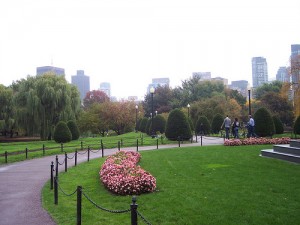The story that begins in a garden ends in a city. And in between, there’s a whole lot of brokenness.
With that brokenness, there is deep mystery. What would compel someone to devise and implement a coordinated attack on innocent people, such as that which we witnessed in Boston? How can we feel safe when random acts of terror strike within our shores? What can prevent a seemingly endless string of tragedies from desensitizing us to evil?
The answers to those questions are not simple, nor should they be. The greatest folly of responses to these kinds of tragic events are ones that are eager to categorize them. Our handle on reality seems more secure when we immediately explain them as “politically motivated,” or “calendar coordinated,” or “message intended.” Speculation is only a temporary salve for shock. Even our best efforts to rationalize senseless acts only last until the next tragedy tears them apart.
An alternative response to these events embraces complexity, rather than shying away from it. This world, after all, is not a simple place. It is diverse, rich, complicated, and unpredictable. Those same qualities that invite chaos, disruption, and disorder are also the essential ingredients for beauty, spontaneity, and innovation. We cannot increase our capacity for good without correspondingly increasing our capacity for harm. Yet, in the end, that kind of notion is hardly comforting in the midst of suffering.
Perhaps the best response is one that neither trivializes tragedy with simple thinking or desensitizes feelings with complex analysis.
When I first heard the news from Boston on Monday, I was in the midst of reading the text I am to preach for this Sunday from Revelation 21. Reading about the “holy city” in John’s vision was an odd juxtaposition to the news from one of our most beloved cities. In that moment I remembered how author Rob Bell once remarked that if sin had never entered the world, the Bible would be a very short pamphlet of only four chapters: Genesis 1 and 2, and Revelation 21 and 22. A story that begins in a garden ends in a city. “And what is a city,” Bell said, “but a collection of organized gardens?”
Most of the biblical narrative, then, exists between the garden and the city, between simplicity and complexity. The essence of the sacred story is the steady advancement of God’s love over and against sin and darkness. It is here that we find our best response to the evils of this world.
1) First, we can lament.
Arise, cry out in the night, at the beginning of the watches! Pour out your heart like water before the presence of the Lord! Lift your hands to him for the lives of your children, who faint for hunger at the head of every street. (Lamentations 2:16)
We grieve the deaths of innocent people, mourn with families facing sudden loss, and hurt for those dealing with unspeakable injuries. The author of Lamentations, witnessing the tragic destruction of Jerusalem, could find no words except those that bellowed from his deepest aches. When our hearts are rendered unable to offer polished and nobler prayers, we have the freedom to lament.
2) We can resist.
“Together as one body, Christ reconciled us to God by means of his death on the cross, and our hostility toward each other was put to death.” (Ephesians 2:6)
We remember our call to resist evil in whatever form it presents itself. Tragedies like this one trigger our innate instincts toward revenge and hatred, and corollary feelings of prejudice and discrimination. We already live in a deeply polarized and factionalized culture, in which we point fingers and fix blame at anyone and anything for everything, and an event like this one can further the fissures of our society. Yet, in the wake of tragedy, it is unity, rather than animosity, that move us toward healing.
3) Finally, we can be agents of transformation.
“Do not be overcome by evil, but overcome evil with good.” (Romans 12:21)
Instant tragedies summon us to acts of self-sacrifice and heroism, such as those exhibited by first responders who leapt into the debris, and by marathon runners who concluded the race by running immediately to donate blood. “Returning violence for violence multiplies violence, adding deeper darkness to a night already devoid of stars,” Dr. Martin Luther King once said. “Darkness cannot drive out darkness: only light can do that. Hate cannot drive out hate: only love can do that.” In the end, we are called to compassionate action, rather than cold resignation and passive analysis.
We can take heart as residents of this side of Easter, for we have an abiding belief in the promise of new life and a hope in the resurrection. Let us pray for all those affected by Monday’s events, and work together toward a future in which God is making all things new.
This article was originally posted on deVega’s blog: http://mdevega.blogspot.com/.
Image: Sparrow, Katherine. Boston Gardens. Available from: Flickr Commons.
Like this post? Subscribe to have new posts sent to you by email the same day they are posted.




Leave a Reply